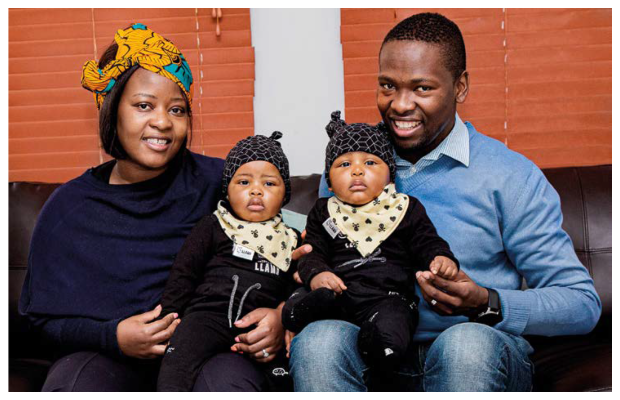
When her son was born Nthabiseng Nhlanhla was relieved to find out he had all his toes. She’d been worried because scans during her pregnancy had shown there might be a problem. Now here he was with 10 fingers and 10 toes – just like his twin brother. But as she gazed at baby Mnqobi she could see one striking difference that set him apart from his sibling, Philasande.
Mnqobi’s feet and ankles bent inwards. Although it looked bad, she wasn’t too worried. Doctors warned he might be born with clubfeet, a condition which they told her was easily correctable. It could be fixed, she told herself – at least he had 10 toes.
But a few days after his birth her hopes were dashed. The problem was much more serious than originally suspected, specialists told Nthabiseng (31) and her husband, Mzwakhe (34).
The reason Mnqobi’s legs were so deformed was because he had tibial hemimelia. It’s a congenital lower-limb condition so rare it occurs only in one in a million children worldwide. Specialists broke the news to the Nhlanhlas: there was nothing they could do to straighten their child’s legs – amputation was the only option.
But Nthabiseng and Mzwakhe refused to accept this verdict. “My husband relentlessly said no, we have to get a second opinion and not just chop off our child’s feet without having done proper research,” says Nthabiseng, an accountant, as she chats to us at their home in Johannesburg.
He’s a little ball of energy, cooing, chortling and looking around at everything with rapt curiosity. At eight months, Mnqobi is the opposite of his laidback twin brother.
Nthabiseng says she and Mzwakhe made a choice early on that amputation would be the last resort for their lively son.
During a routine ultrasound in her third trimester they’d been warned that one twin’s legs looked bent. “The doctor initially said it was clubfoot and we shouldn’t worry,” Nthabiseng says.
So she and Mzwakhe were stunned when three days after delivery doctors broke the news that there was nothing they could do for Mnqobi.
“When they did the X-rays they saw that his bones hadn’t actually come together.”
The couple found US-based orthopaedic surgeon Dr Dror Paley, who specialises in procedures for limb lengthening and deformity correction and runs the Paley Institute at St Mary’s Medical Centre in West Palm Beach, Florida.
“We immediately researched him and saw that he’d even been on The Oprah Winfrey Show and we thought, ‘This guy’s legit,’ Nthabiseng says.
Paley has performed numerous surgeries on children with lower-limb congenital defects, including another South African, Phenyo Moropa. Like Mnqobi, three-year-old Phenyo was born with tibial hemimelia but in her case the condition only manifested in one leg (Baby steps, 9 August 2018).
She underwent surgery in America last year, which has put her on the path to mobility and taking her first steps. Now the Nhlanhlas are hoping Paley can help their child. They sent him Mnqobi’s X-rays via email and after inspecting them Paley told them reconstruction is definitely possible.
They started a drive called Help Q Walk to raise the funds and launched a website. And they were amazed at how complete strangers were moved to help Mnqobi, who’s affectionately nicknamed Baby Q.
“We started the campaign with just our friends and family but then it got bigger and bigger,” Nthabiseng says. In about six months they raised R1,3 million through fundraising events, medical aid contributions and private donations.
But they have just 10 months to raise the remaining R1,6 million.
MnqobiI has to undergo surgery while he’s still little otherwise the recovery time becomes longer and the success rate decreases. Surgery at the age of 18 months would be best because this will give his kneecaps the chance to develop properly, his mom explains.
Mnqobi’s proposed treatment consists of three surgeries to both legs (see box below). Depending on his recovery, Nthabiseng might have to quit her job and move to the US for more than a year while Mzwakhe holds down the fort.
But right now they’re just relieved Paley’s plan doesn’t require amputation. The couple are in the process of starting a foundation aimed at helping other children like their son.
“Ultimately the plan is to get this infrastructure and the skill into South Africa because we can’t all go to the United States,” Nthabiseng says. “I’m hoping – this is my long-term goal – that I can get the department of health to back us up.”
Fittingly, Mnqobi means conqueror in isiZulu. If his surgery is a success it could pave the way for other kids like him – and offer hope to their desperate parents. “If we can do that then we’ll know we’ve conquered,” Nthabiseng says.


















